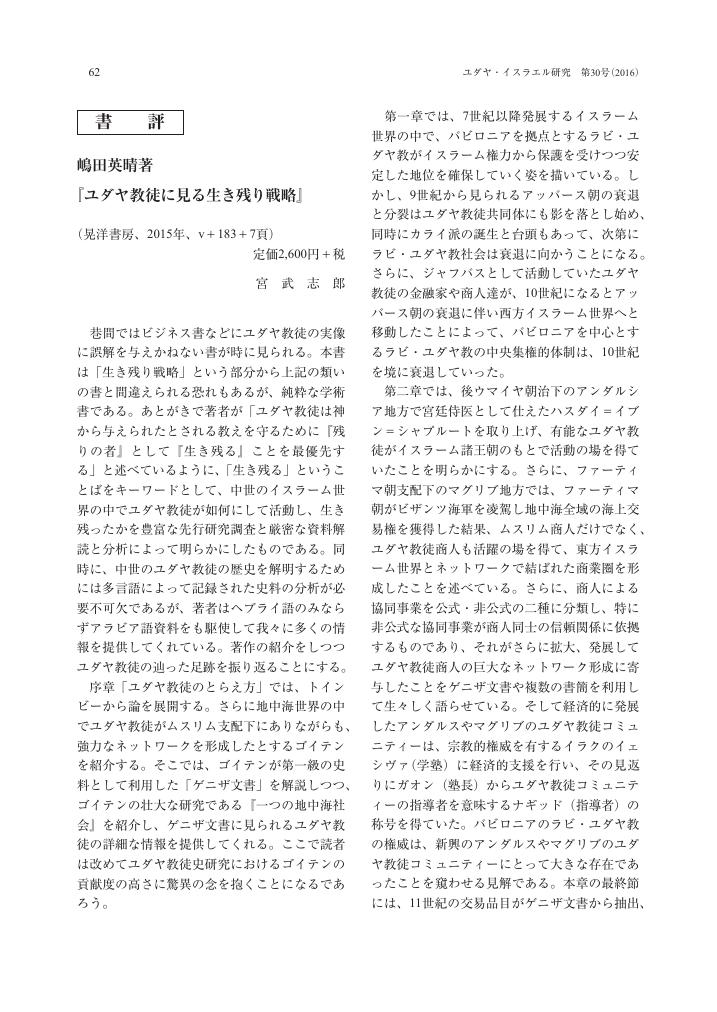15 0 0 0 OA 15・16世紀オスマン海軍による火器技術の受容
- 著者
- 宮武 志郎
- 出版者
- 一般社団法人 日本オリエント学会
- 雑誌
- オリエント (ISSN:00305219)
- 巻号頁・発行日
- vol.34, no.1, pp.48-64, 1991-09-30 (Released:2010-03-12)
The Ottoman dynasty began to rapidly introduce firearms to galleys and roundships from the last decade of the 15th century. Use of such firearms had been prevalent from the second half of the same century among the Mediterranean countries. The Ottomans employed Sephardim cannon-founders who had been expelled from the Iberian peninsula and whose techincal skills were of a very high level.This Ottoman policy toward the Zimmi should be recognized as one of the reasons for her military and economic achievements in the 16th century.
8 0 0 0 OA 地中海世界におけるユダヤ教徒 オスマン帝国を中心に
- 著者
- 宮武 志郎
- 出版者
- 日本ユダヤ学会
- 雑誌
- ユダヤ・イスラエル研究 (ISSN:09162984)
- 巻号頁・発行日
- vol.28, pp.109-119, 2014 (Released:2017-04-07)
4 0 0 0 ヨセフ・ナスィ:オスマン朝における元マラーノの軌跡
- 著者
- 宮武 志郎
- 出版者
- 学術雑誌目次速報データベース由来
- 雑誌
- オリエント (ISSN:00305219)
- 巻号頁・発行日
- vol.39, no.1, pp.149-165, 1996
The Nasi family of Marranos (crypt-Jews) expanded its commercial activities not only in the Ottoman Empire but also in the Mediterranean world and Eastern and Western Europe during and after the Christian persecution. The Nasi family was led by Donna Gracia and her nephew and son-in-law, Don Joseph Nasi: the former claimed to have returned to Judaism during her refuge in Ferrara, but the latter returned to Judaism after his immigration to the Ottoman Empire.<br>Joseph took advantage of various ways to develop his economic, political and communal activities. For example, the Nasi family set up its close relationship with the Ottoman court through the Jewish court physicians, especially Moshe Hamon, when they immigrated to Istanbul in the first half of the 1550s. Their economic success owed to commercial and intelligence networks, and to many other factors and agents, that they had inherited from the Mendes family.<br>The Ottoman archives and Rabbinical Responsa show evidence of Joseph's aggressive attitude and of his commercial and intelligence networks at three points.<br>The first was the Ancona Boycott, when Joseph attempted to take advantage of his Jewish faith and use Sephardic Rabbis as his propagandists. His ends were to spread his leadership over many independent Jewish communities, to improve the heretic status of Marranos, and to monopolize Mediterranean trades.<br>The second point was the rebuilding of Tiberias. Gracia rebuilt the old Palestinian city mainly for her own pious motives, but Joseph seized on her plan as a good opportunity to extensively develop his economic activities. At the same time, this plan involved Jewish court physicians as Joseph's messengers to the Ottoman court.<br>The last point was Joseph's friendship with Selim II, the eleventh Ottoman Sultan. The Sultan awarded him the "Dukalik: similar to the authorities of Sancakbeyi" of Naxos and Cyclades which gave him a uinque political status as well as commercial privileges in domestic and foreign trade.<br>The conclusion must be drawn that Joseph Nasi was not a Jewish hero who had the character of a proto-Zionist, but a realistic businessman who gave precedence to his profits over his Jewish faith.
1 0 0 0 OA 嶋田英晴著『ユダヤ教徒に見る生き残り戦略』
- 著者
- 宮武 志郎
- 出版者
- 日本ユダヤ学会
- 雑誌
- ユダヤ・イスラエル研究 (ISSN:09162984)
- 巻号頁・発行日
- vol.30, pp.62, 2016 (Released:2020-09-26)
1 0 0 0 OA 市川裕編著『図説 ユダヤ教の歴史』
- 著者
- 宮武 志郎
- 出版者
- 日本ユダヤ学会
- 雑誌
- ユダヤ・イスラエル研究 (ISSN:09162984)
- 巻号頁・発行日
- vol.29, pp.108, 2015 (Released:2020-09-18)
1 0 0 0 OA ヨーロッパ・地中海世界における異宗教・異宗派間の相剋と融和をめぐる比較史研究
- 著者
- 深沢 克己 齊藤 寛海 黒木 英充 西川 杉子 堀井 優 勝田 俊輔 千葉 敏之 加藤 玄 踊 共二 宮野 裕 坂野 正則 辻 明日香 宮武 志郎 那須 敬 山本 大丙 藤崎 衛
- 出版者
- 東京大学
- 雑誌
- 基盤研究(A)
- 巻号頁・発行日
- 2009
当初の研究計画に即して、国際ワークショップと国際シンポジウムを3年連続で組織し、第一線で活躍する合計14名の研究者を世界各国から結集して、キリスト教諸宗派、イスラーム、ユダヤ教などを対象に、広域的な視野のもとで異宗教・異宗派間の関係を比較史的に研究した。これにより得られた共通認識をふまえて、研究者間の濃密な国際交流ネットワークを構築し、研究代表者を編集責任者として、全員の協力による共著出版の準備を進めることができた。


